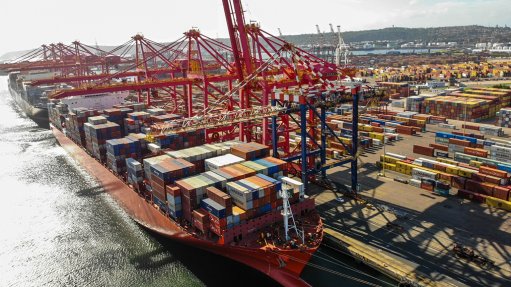DP World urges change to cold chain temperature to -15 °C to reduce emissions
Logistics company DP World has set up an industry-wide coalition to explore the feasibility of changing the temperature that frozen food is transported and stored at from -18 °C to -15 °C, named Join the Move to -15 °C, which would lead to cost savings of between 5% and 12%.
Most frozen food is transported and stored at -18°C, a standard that was set 93 years ago and has not changed since, the company notes.
Researchers from the Paris-based International Institute of Refrigeration, the University of Birmingham and London South Bank University found that a move to -15 °C could make a significant environmental impact with no compromise on food safety or quality.
The study, which was supported by DP World, showed that the change could save 17.7-million tonnes of carbon dioxide a year, which is the equivalent emissions of 3.8-million cars a year.
Further, the change would create energy savings of around 25 TW/h, which is equivalent to 8.63% of the UK’s yearly energy consumption. The change would also cut costs in the supply chain by at least 5% and in some areas by up to 12%, the study found.
The Join the Move to -15 °C coalition aims to redefine frozen food temperature standards to cut greenhouse gases, lower supply chain costs and secure food resources for the world’s growing population.
“Frozen food standards have not been updated in almost a century. They are long overdue for revision. A small temperature increase could have huge benefits. However, regardless of each individual organisation's commitment, the industry can only change what is possible by working together,” says DP World Group chief sustainability officer Maha AlQattan.
The coalition has already been joined by industry organisations, including US-based AJC Group; AP Moller; Maersk of Denmark; Daikin of Japan; DP World; the Global Cold Chain Alliance; Switzerland’s Kuehne + Nagel International; US-based Lineage; Mediterranean Shipping Company of Geneva; and Singapore-based Ocean Network Express.
“Through this research, we can see how we can deploy accessible storage technologies in all markets to freeze food at sustainable temperatures, while reducing food scarcity for vulnerable and developed communities,” she says.
“With this research and newly formed coalition, we aim to support collaboration across the industry to find viable ways to achieve the sector’s shared net-zero ambition by 2050. Join the Move to -15 °C will bring the industry together to explore new, greener standards to help decarbonise the sector on a global scale.”
Freezing food extends its shelf life, but requires significant amounts of energy for every degree below zero that food is stored at.
The logistics industry is also working to decarbonise while facing rising energy bills, AlQattan says.
However, it is estimated that 12% of food produced each year is wasted owing to a lack of refrigerated and frozen logistics, or cold chain, highlighting a significant need for greater capacity, she adds.
The need is particularly acute in areas such as sub-Saharan Africa and the Indian Subcontinent. In Pakistan, in 2022, for example, half of exportable mangoes were lost owing to an extreme heatwave.
Studies suggest that 1.3-billion tonnes of edible food is thrown away every year, or a third of global food production for human consumption.
The Join the Move to -15 °C initiative aims to create a just transition and deploy accessible storage technologies globally to freeze food at sustainable temperatures to reduce food scarcity for vulnerable and developed communities alike, she says.
“Cold chains are critical infrastructure, vital for a well-functioning society and economy. They underpin our access to safe and nutritious food and health, as well as our ability to spur economic growth. Cold chain infrastructure, and the lack of it, have implications for global climate change and the environment,” University of Birmingham and Heriot-Watt University Centre for Sustainable Cooling director Professor Toby Peters saysd.
Climate change-driven events, such as droughts, floods and heatwaves, can reduce crop yields and harm livestock health and productivity.
However, freezing food can protect food sources and their nutritional value for months, even amid such crises.
“Cutting cold chain emissions and transforming how food is safely stored and moved today helps ensure we can keep sustainably feeding communities across the globe, as populations and global temperatures rise, thereby protecting nutritious food sources for years to come.
“Building on this research, DP World’s coalition can be a key tool for overcoming today’s food challenges too, providing a stable inventory of quality food for the 820-million starving people worldwide and security for another 2 billion who are struggling with food scarcity,” Peters says.
DP World has made the research accessible to all and has invited stakeholders, industry leaders and interested parties to support the campaign.
Comments
Press Office
Announcements
What's On
Subscribe to improve your user experience...
Option 1 (equivalent of R125 a month):
Receive a weekly copy of Creamer Media's Engineering News & Mining Weekly magazine
(print copy for those in South Africa and e-magazine for those outside of South Africa)
Receive daily email newsletters
Access to full search results
Access archive of magazine back copies
Access to Projects in Progress
Access to ONE Research Report of your choice in PDF format
Option 2 (equivalent of R375 a month):
All benefits from Option 1
PLUS
Access to Creamer Media's Research Channel Africa for ALL Research Reports, in PDF format, on various industrial and mining sectors
including Electricity; Water; Energy Transition; Hydrogen; Roads, Rail and Ports; Coal; Gold; Platinum; Battery Metals; etc.
Already a subscriber?
Forgotten your password?
Receive weekly copy of Creamer Media's Engineering News & Mining Weekly magazine (print copy for those in South Africa and e-magazine for those outside of South Africa)
➕
Recieve daily email newsletters
➕
Access to full search results
➕
Access archive of magazine back copies
➕
Access to Projects in Progress
➕
Access to ONE Research Report of your choice in PDF format
RESEARCH CHANNEL AFRICA
R4500 (equivalent of R375 a month)
SUBSCRIBEAll benefits from Option 1
➕
Access to Creamer Media's Research Channel Africa for ALL Research Reports on various industrial and mining sectors, in PDF format, including on:
Electricity
➕
Water
➕
Energy Transition
➕
Hydrogen
➕
Roads, Rail and Ports
➕
Coal
➕
Gold
➕
Platinum
➕
Battery Metals
➕
etc.
Receive all benefits from Option 1 or Option 2 delivered to numerous people at your company
➕
Multiple User names and Passwords for simultaneous log-ins
➕
Intranet integration access to all in your organisation

















